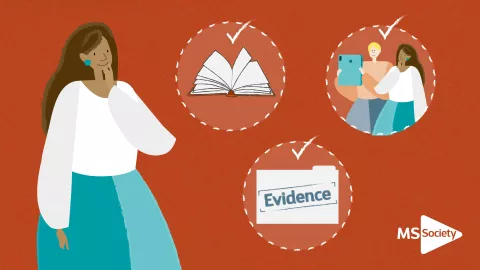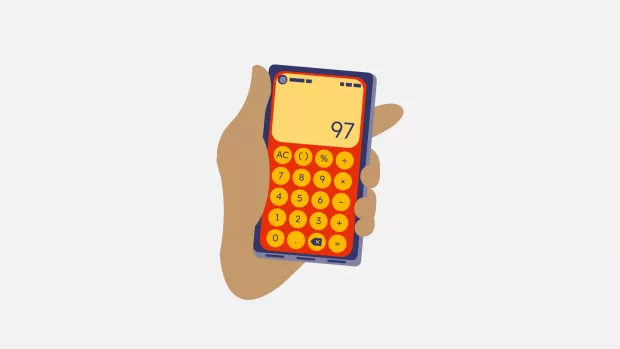
PIP - 'It's a hassle, but there are ways to get over the hurdles'
There’s no doubt that for many people with MS, claiming PIP is a massive hassle. It might even feel overwhelming. But if you can get PIP (Personal Independence Payment) it’s extra money every week that you’re entitled to. And there are ways to make the task of claiming a bit more manageable.
Break it into chunks and make notes
One of the big hurdles to claiming PIP is the long claim form you need to complete. But you don’t have to do it all at once.
Fill in the form in small chunks. Maybe a question or two a day. People tell us it’s far less overwhelming when they rest in between, break it down and have pauses. If you use a paper claim form, doing rough notes or a draft in advance can help.
You can also break the task up if you fill in the form online. You can save the form as you go along. Plus, until you submit it, you can change what you’ve written if you need to. When you do submit it online, you’ll get an email confirming they’ve got your claim, which can be reassuring.
Be specific - the 50% rule
Always bear in mind the 50% rule. The PIP process needs to know if you have difficulty with, or can’t do, daily tasks 50% of the time or more. So that’s at least half of the time.
If you are affected half the time or more, you have to let the assessor and DWP decision maker know very clearly. For example, it’s good to use phrases like ‘most days’ or ‘4 or 5 days a week’ to explain how you’re affected. Don’t use the phrase ‘sometimes’ in the claim form or the assessment. The assessor could interpret ‘sometimes’ as less than 50% of the time, even if you mean more than.
Step-by-step guides and diary templates
We’ve got a free step-by-step guide to PIP which helps explain the claim form. It has examples of how to answer each question and the detail you should include.
Before you claim, you might also find it helps to keep a diary, recording the information the form will ask about. For example, the kind of detail that’s useful could be: “Washing and bathing takes 1 hour most days. That’s because of fatigue and weakness in my legs. I have to sit and rest before drying myself after the bath or shower.”
Download our free PIP diary template
Getting help to complete the form
If you’d like some help going through the form, it’s worth checking for local support.
Your local Citizens Advice, Age UK or another advice agency might be able to complete the claim form with you. Local MS Society groups might know of local support. Some advice agencies provide this service face to face or even come to your home. But it does vary area to area.
Find support near you through Advice Local
If there’s a long waiting list for this support where you are, you can ask for an extension to the deadline. Call the PIP enquiry line and explain why you need the extra time to complete the form.
And do call us on the MS Helpline for help and guidance around each stage of the claim process – that’s what we’re here for!
Can friends or family help?
Do you have close friends or family who can help? For example, they may notice things you have difficulty with that you’ve not thought about - which could be helpful for the form and assessment. Perhaps they could do supporting letters with this information. Or accompany you at your PIP assessment meeting.
Supporting evidence from care professionals
Your PIP claim is more likely to be successful if you provide medical evidence from your health or social care professionals. Try to submit as much supporting medical evidence as possible with your PIP form.
We have template letters we can send you for requesting supporting evidence. Get in touch if you'd like these.
Supporting evidence for a PIP claim could include:
- a letter from your GP, neurologist, or MS nurse
- medical records
- an occupational therapist report that recommends equipment or home adaptations
- fit notes (if you’ve been off work)
If you’re struggling to get enough supporting evidence from a medical professional, here are some other types of evidence which may be useful:
- your care plan or needs assessment report
- a Work Capability Assessment report (if you get Employment and Support Allowance or Universal Credit)
- a statement from your support worker
- a statement from your carer, family member or friend
- a diary of your symptoms
Make sure you check that your evidence supports what you wrote on your PIP form before you send it in.
Get in touch for PIP advice
You can contact us if you would like more advice on PIP. Get in touch through the MS Helpline on 0808 800 8000 or email [email protected].



